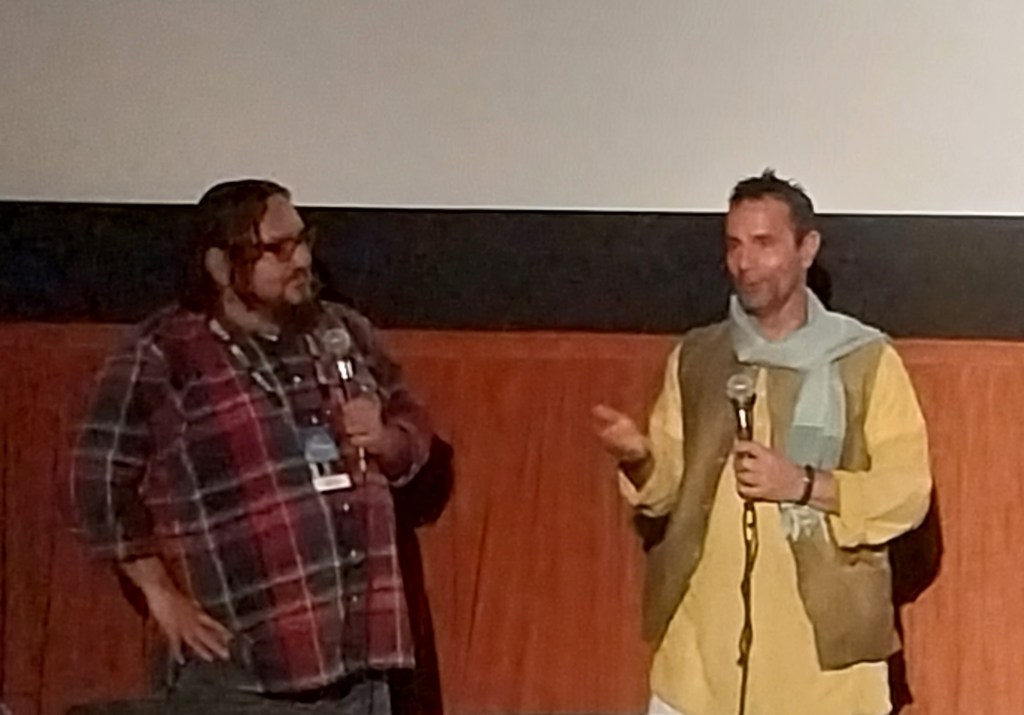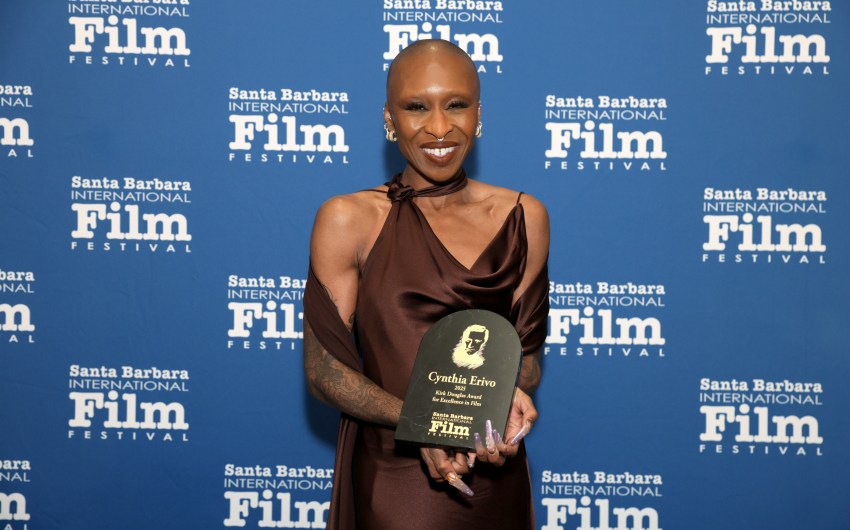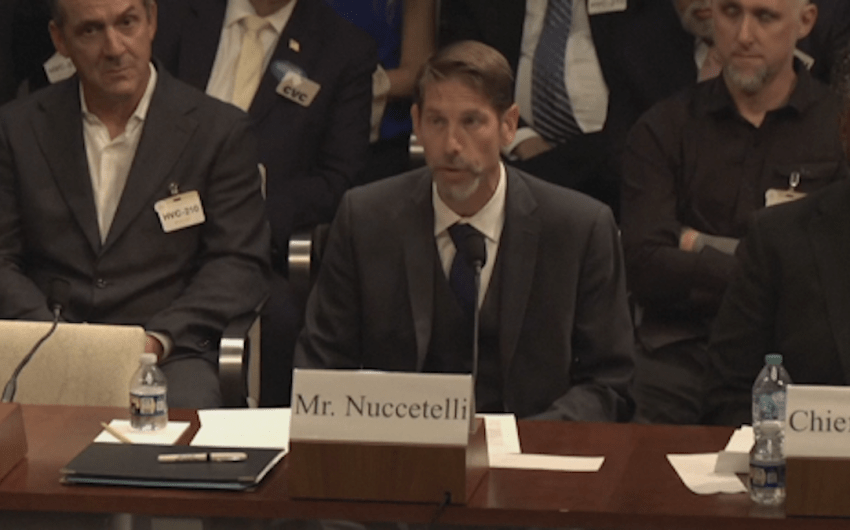
SBIFF 2024 is a year of paying homage to substantial actors who haven’t gotten their due as leading actors. Certainly, that’s the case with Robert Downey, Jr. and Mark Ruffalo, whose tribute nights served to remind us of their tremendous range and dedication to craft, in spite of a paucity of notable leading spotlights. So it goes, as well, with last night’s Arlington “Montecito Award” tribute subject Jeffrey Wright. His smashing work as the lead of American Fiction earned him a deserved Oscar nod but also reminded us that a filmography packed with juicy supporting roles (including in Wes Anderson’s ironic charmer Asteroid City) has only gone to the lead actor place in such notable films as Basquiat. And yet the rich fabric of his filmography going back to 1990 makes him an influential legend hiding in semi-plain sight.
In discussing his Oscar-nom’ed film role, Wright noted it was a saga about a “family that puts the ‘fun’ in ‘dysfunctional,’” but also pointed that “it’s just everybody’s family.” In the plot about a serious black author succumbing to a nom de plume and pandering style to sell books, “he’s dealing with his situation while trying to express his true self.
“The satire is great. and stirs conversations. We’re not smart about talking about race, but we’re all thinking about it. We can do it in this film and can even laugh while doing that. But for me, it was all about family. That’s the heart, body, and soul of the film.”
Dear Jassi

It’s a rare occasion when a director, while introducing his/her new work at a film festival, warns the crowd that what they’re about to see may be harsher than what has been advertised. But so it went when Indian director Tarsem Singh Dhandwar prefaced the U.S. premiere of his film Dear Jassi at the Metro last night by warning the audience that the film was “harsher than might be advertised.”
Where did it rank on the harsh scale? Depends on the viewer. A western audience accustomed to gangster lore and raw degrees of sex and violence might find this “Romeo and Juliet”–themed Punjabi tale of class struggle and extreme prejudice fairly tame. Violence is sequestered to mostly off-screen settings and sex is suggested in before-and-after fashion, in check with the relatively chaste Bollywood code of conduct.

Still, there are plenty of points of tension and brewing violence in this tale, based loosely on a true story, of a young woman in an Indian community in Canada who falls in love with a poor (but buff) rickshaw driver in Punjab, much to the serious chagrin and ultimate retributions of her fiercely old school affluent family/caste. The tragic epic is a powerful piece of cinema, beautifully visualized, and with a story unfolding in both realistic and romanticized styles, while basking in the sometimes anarchic, sometimes lyrical ambience of Delhi.
In the post screening Q&A, Dhandwar explained that the script was “reverse engineered” from 1996 journalistic reports of a phone call in which a mother disowns — and essentially signs a death warrant — for her “wayward” daughter. He expressed his disapproval of the term “honor killing,” saying “there’s nothing honorable about killing a child for marrying someone.”
This is a departure for the director, whose films tend to be more fantastical, alongside his work with commercials and music videos. He went into the project with a strong intention that it “should be cold and neo-realist. There’s nothing fantastical about this.”
Last night, a heckler in the crowd weirdly nitpicked scenes he disapproved of, but the director acquitted himself gracefully. The harsh in-house moment was summarily quelled, but it made for a classic film festival moment in our not-so-sleepy town.
Refugee Tales from All Over
The subject of refugees, all too relevant in modern times, has been a recurring theme on this year’s festival program. Three very different films and contexts take on the topic in engaging ways.
The very aptly titled In the Rearview, a Polish documentary qualifying as one of the more inventive variations in that genre in this SBIFF line-up, adheres to a deceptively simple yet powerful format. As with Abbas Kiarostami’s Ten, with its taxi tales presented inside a vehicle, Maciek Hamela’s doc shows you the unfolding tragedy of the Ukrainian war via van loads of refugees being transported out of the war zone. The human cargo mostly seen through the rear view the driver’s rearview mirror and the exterior shots of the war-torn terrain they’re passing through convey their own stories and struggles. The minimalist framework only serves to give us a fresh perspective, far from the machinery of media reportage and sensationalism.
The refugees in question in the polished British film One Life are Czech children just prior to the Nazi invasion and clampdown of that country in 1939, rescued and transported to England through an effort lead by Nicholas “Nicky” Winton, played in his later years by Anthony Hopkins. This true story, and which 669 mostly Jewish children were saved, jumps from the late ‘30s scene of the effort to the 1986 rediscovery and celebration of Winton’s project. Filmically, it is that last episode which has the greatest power to move, partly thanks to Hopkins’ organic mastery on screen.
Before it Ends deals with a very different sort of refugee crisis — a group of German refugees towards the very end of WWII, sent to find a haven from Russian attacks to a small Danish town. In director Anders Walter’s telling of a true story, the principal of the local “Folk High School” faces the moral quandary of whether to help treating a diphtheria scourge in the German group — and face ostracism as a traitor — or turn a blind eye to the victims. Fuzzy ethical lines, family tensions during wartime, and the wages of compassion are among the undertones humming through this fine Danish film.
Quick pix
In the furious flow and pile-up of films screened, for avid SBIFF-goers, the mental lens begins to blur. It’s a common symptom of film festival saturation. For therapy and self-care, it can be important to take notes and highlight the films which rise out of the pack. And it has been a more substantial and intriguing pack this year, thanks to the work of third-time programming director Claudia Puig and team. In that light, we present a sampler of recommended fare from the evidence so far.
Made in a raw, mock-doc style by young Olmo Schnabel (yes, son of artist and Basquiat director Julian, who appeared in a weirdly fuzzy video toast in the Wright tribute), Pet Shop Days takes us into hedonistic fringes and gilded mean streets of N.Y.C., by way of a loose cannon rebel son from Mexico and his new lover/accomplice. Our rich boy leads them in and out of trouble, sex and drugs and sometimes crime for kicks.
The film is surprisingly well-stocked with famed cinema names, including Willem Dafoe, Peter Sarsgaard as a nervous pimp, and Emmanuel’s Seigner and executive producer Martin Scorsese. Interestingly, a Mean Streets echo can be found in the volatile and fatalistic antihero (Darío Yazbek Bernal) in a role reminiscent of Robert DeNiro’s wild card “Johnny Boy” character, right to the bitter end.

Cinema obsession is going around town at the moment and is even an officially sanctioned local ritual during SBIFF-time. That said, hopeless cinephiles should find much to relate to in the strange and wonderful finish documentary Cinéma Laika. Director Veljko Vidak’s film is essentially a tribute to the art of film fanaticism, even in a place not considered a cinema hub and, most specifically, a tribute to the Great Finnish director Aki Kaurismäki, responsible for creating a respectable cinema in a factory in the small village of Laika, near his home.
This quirky cinema icon created a celebrated triple-threat hangout in Helsinki — a combo pool hall and downstairs retro music club and movie theater — which operated for many years before development pushed it out a few years back. (I felt very lucky to have been there a couple of times as part of my jazz festival travels). Not one to sit still or let his energy go lax, Kaurismäki spearheaded the creation of the Cinema Laika in a seemingly unlikely outpost.
The unorthodox doc, which proceeds slowly and laterally — not unlike a Kaurismäki film — seduces us with its strange brew of an ambient style. Among the interviewees is Kaurismäki’s friend and occasional collaborator Jim Jarmusch. Some of us will also find that this unique movie house in an obscure Finnish town has now become a film nerd pilgrimage site.
Premier Events
Sun, Jan 11
3:00 PM
Santa Barbara
Mega Babka Bake
Sun, Jan 04
7:00 AM
Solvang
Solvang Julefest
Mon, Jan 05
6:00 PM
Goleta
Paws and Their Pals Pack Walk
Mon, Jan 05
7:00 PM
Santa Barbara
Ancient Agroecology: Maya Village of Joya de Cerén
Tue, Jan 06
7:00 PM
Santa Barbara
Amazonia Untamed: Birds & Biodiversity
Wed, Jan 07
7:30 PM
Santa Barbara
SBAcoustic Presents the John Jorgenson Quintet
Thu, Jan 08
5:30 PM
Santa Barbara
Blueprints of Tomorrow (2026)
Thu, Jan 08
6:00 PM
Isla Vista
Legal Literacy for the Community
Thu, Jan 08
7:30 PM
Santa Barbara
Music Academy: Lark, Roman & Meyer Trio
Fri, Jan 09
8:00 AM
Santa Barbara
Herman’s Hermits’ Peter Noone: A Benefit Concert for Notes For Notes
Fri, Jan 09
6:00 PM
Santa Barbara
Ancestral Materials & Modernism
Sun, Jan 11 3:00 PM
Santa Barbara
Mega Babka Bake
Sun, Jan 04 7:00 AM
Solvang
Solvang Julefest
Mon, Jan 05 6:00 PM
Goleta
Paws and Their Pals Pack Walk
Mon, Jan 05 7:00 PM
Santa Barbara
Ancient Agroecology: Maya Village of Joya de Cerén
Tue, Jan 06 7:00 PM
Santa Barbara
Amazonia Untamed: Birds & Biodiversity
Wed, Jan 07 7:30 PM
Santa Barbara
SBAcoustic Presents the John Jorgenson Quintet
Thu, Jan 08 5:30 PM
Santa Barbara
Blueprints of Tomorrow (2026)
Thu, Jan 08 6:00 PM
Isla Vista
Legal Literacy for the Community
Thu, Jan 08 7:30 PM
Santa Barbara
Music Academy: Lark, Roman & Meyer Trio
Fri, Jan 09 8:00 AM
Santa Barbara
Herman’s Hermits’ Peter Noone: A Benefit Concert for Notes For Notes
Fri, Jan 09 6:00 PM
Santa Barbara
























You must be logged in to post a comment.